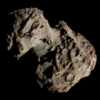 A map of the orbit A map of the orbit | |
| Discovery | |
|---|---|
| Discovered by | David Rabinowitz |
| Discovery date | 1 May 1992 |
| Orbital characteristics | |
| Epoch | 1993-Sep-10 (JD 2449240.5) |
| Aphelion | ~75000 AU (epoch 1800) ~3700 AU (epoch 2200) |
| Perihelion | 3.007 AU (q) |
| Eccentricity | 0.99996 |
| Orbital period | ~78,000 years (Barycentric epoch 2200) |
| Inclination | 124.319 |
| Last perihelion | 6 September 1993 |
C/1992 J1 (Spacewatch) is a comet that was discovered 1 May 1992 by David Rabinowitz of the Spacewatch Project. This was the first comet to be discovered using an automated system.
Using a generic heliocentric (two-body) solution calculated near the time of perihelion (closest approach to the Sun), it is estimated to have an aphelion (Q) (furthest distance from the Sun) of 154,202 AU (more than 2 Light-years). But the orbit of a long-period comet is properly obtained when the osculating orbit is computed at an epoch after leaving the planetary region and is calculated with respect to the center of mass of the Solar System. After leaving the planetary region of the Solar System, the post-perihelion orbital period is estimated to be about 78,000 years with aphelion around 3,650 AU. In 2007 it reached more than 30 AU from the Sun.
See also
- Comet Lulin (C/2007 N3) another comet with a near parabolic orbit
- List of Solar System objects by greatest aphelion
References
- ^ "Spacewatch Outer Solar System Discoveries". Lunar and Planetary Laboratory, University of Arizona. Archived from the original on 29 October 2008. Retrieved 15 April 2009.
- ^ Nakano, Syuichi (4 June 1995). "C/1992 J1 (Spacewatch)". OAA computing section circular, NK 1490. Retrieved 15 April 2009.
- ^ Horizons output. "Barycentric Osculating Orbital Elements for Comet C/1992 J1 (Spacewatch) at epoch 1800 and 2200". Retrieved 7 October 2012. (Solution using the Solar System barycenter. Select Ephemeris Type:Elements and Center:@0)
- "JPL Small-Body Database Browser: C/1992 J1 (Spacewatch)". Jet Propulsion Laboratory. 2 February 1995. Retrieved 31 January 2010.
External links
- Orbital simulation from JPL (Java) / Horizons Ephemeris

